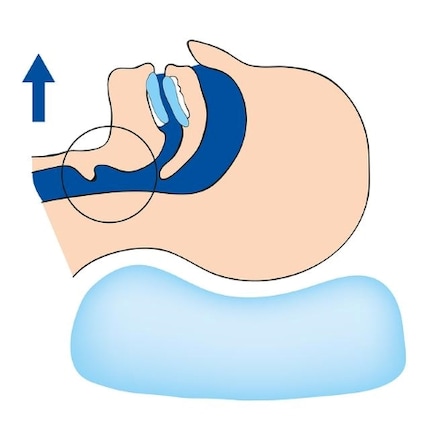
Product test
I’m declaring war on my snoring
by Patrick Vogt

In an attempt to stop snoring, I tried various devices designed to help. But there was one product that I got immediately tired of – in the truest sense of the word.
In a recent article, I outed myself as a snorer. But don’t get the wrong idea. It’s not something I’m proud of. I’m only trying to combat my nighttime disturbance for my wife’s sake. To do this I ventured into the world of supposed snore stoppers. I’d never have dreamed these would ruin my sleep the moment I used one.
For my first review, I chose a mandibular splint, more commonly known as a snoring- or an anti-snoring splint. There are lots of different models on the market, and we also have some in our range.
So how do they work? Snoring splints pull your lower jaw forward ever so slightly. This stops your tongue, palate and uvula from falling back as you sleep, thus keeping your airways clear. As a result, it’s primarily used to combat snoring that’s caused by the throat narrowing. It’s best to let a sleep specialist determine whether this is the issue you have before you go ahead and start using a splint.

Most snoring splints are custom-made to fit your mouth and teeth. With the splint I’m using, the first thing I had to do was put it in hot water to make it soft and malleable, then place it in my mouth and bite down. When cooled, the splint retains the shape of my dental impression.
After doing all that, I was ready to put it to the test for the first time. So, off I went to bed with the splint. For the time being, I pushed aside the unpleasant feeling of having to fall asleep with something in my mouth. I was hoping I’d get used to it. It turns out, I couldn’t have been more wrong. About three hours of restless tossing and turning later, I gave up in exasperation and took the splint out. Within five minutes, I fell into a blissful sleep, probably snoring and not caring.
However, this initial setback didn’t stop me trying again. For nights on end, I shoved the snoring splint into my mouth before going to bed. Each time, the result was the same. Even a more expensive and thus presumably better splint couldn’t do anything to change this.
To cut a long story short: snoring splints only work for me when accompanied by an extremely unpleasant side effect. They actually stop me snoring because I can’t sleep. And that can’t be the point, can it?!
Despite this setback, I’m wary of dissuading you from getting a snoring splint. After all, it’s not the device’s fault that I can’t sleep when I have something in my mouth. Moreover, a lot of people have reported good experiences, most notably that they hardly or no longer snore at all. The majority of reviews for the Somnofit-S in our store, for example, are positive. It’s rightly at the forefront of the sleep therapy sector.

As for me, I won’t be giving snoring splints a go for the time being. I value my sleep too much for that. But the «stop snoring» mission is far from being a failure; in fact, it’s only just begun. Stay tuned, because it won’t be long before I reveal which snore stopper I’ll be putting to the test next.
Have you ever tried a snoring splint? What did you think of it? Let me know in the comments.
Header image: Oscimed
I'm a full-blooded dad and husband, part-time nerd and chicken farmer, cat tamer and animal lover. I would like to know everything and yet I know nothing. I know even less, but I learn something new every day. What I am good at is dealing with words, spoken and written. And I get to prove that here.